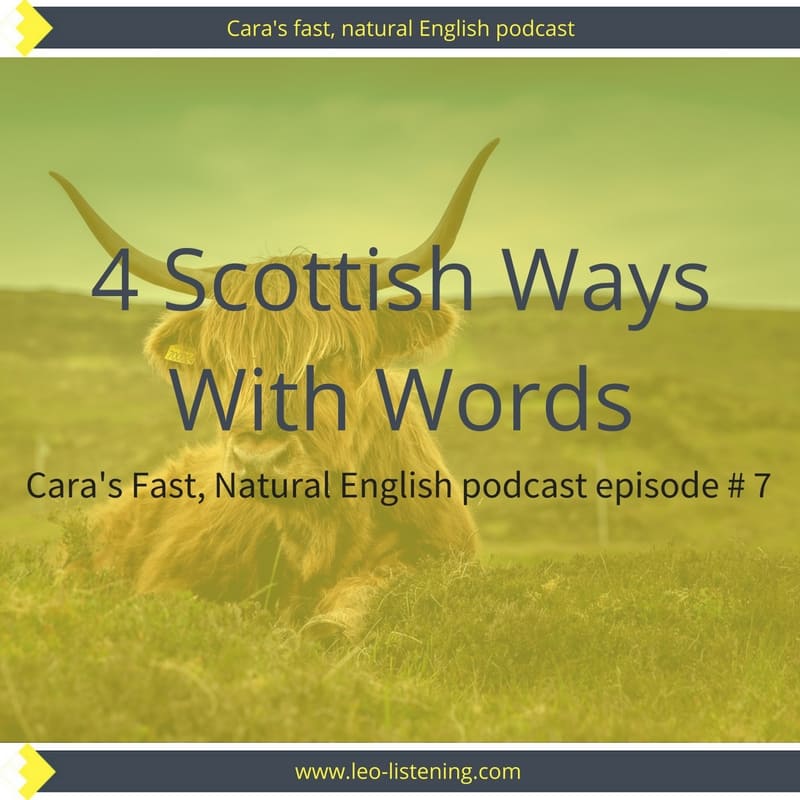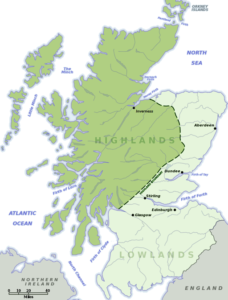Podcast # 7: 4 Scottish Ways With Words

Did you know that I’m in fact Scottish?
You may have seen on my About Me page that I’ve lived in both Scotland and England, but I was actually born in Scotland and my parents have moved back there to retire.
I was in Scotland just last week and yesterday I spoke to my parents on the phone so I’m feeling in a Scottish mood. This got me thinking about some differences between the Scottish variety of English, called Scots, and standard English.
When I moved to England aged 12, I started to lose both my accent and the Scottish dialect words I used to use.
In this podcast, I talk to you about the languages and dialects of Scotland and 4 very Scottish ways with words. The idiom, to have a way with words, means that you use words in a stylish and effective way.
Before You Listen
Useful Vocabulary

Map showing the boundary between the Scottish Highlands and Lowlands. By Jrockley [Public domain], via Wikimedia Commons
While Listening
As usual, I’ve picked out some sections for you to transcribe. Listen to them several times and write down what you hear. The answers are underneath. Good luck!
Episode 7: Dictation 1
Episode 7: Dictation 2
Episode 7: Dictation 3
- Dictation 1: so you probably don’t know…or maybe you do …I was born in Scotland and I lived in Scotland till I was about 12 years old
- Dictation 2: So, when you speak to someone..you know you’re speaking to someone Scottish when they say to you something like ‘oh aye?’ instead of ‘oh yes?’
-
Dictation 3: and my accent varies according to you know who I’ve been speaking to, what I’ve been doing
8 Of My Favourite Scottish Words And Expressions
- blether = someone who talks a lot. In other informal varieties of English you would call this type of person a “chatterbox”.
- wee = little, small, normally an endearing term “you’re a wee blether”
- a wee bit = a little bit
- gonnae no dae that = in standard English this would be “please don’t do that” or “stop doing that”. In Scots, the negative ‘not’ is ‘no’ as you heard in the podcast “How no?” (=Why not?)
- nae bother = no problem
- squint/squinty = if an object is squint or squinty then it’s not straight. In Glasgow, there is a bridge which is nicknamed “squinty bridge”, because of its curved shape. The official name is actually the Clyde Arc.
- numpty/eejit = if you’re a numpty or an eejit then you’re stupid or incompetent
- at the back of + time = just after + time. For example, I’ll be at your house at the back of ten = I’ll be at your house just after ten
Cara, this is some excellent material! I love, love, love everything that has to do with Scotland! So looking forward to the new episodes, and I’ll be sharing your blog with my subscribers as well <3
Hi Cara. You may or may not know that the Scots influence has a much farther reach than just Scotland! I ‘m a Brit living and teaching in NZ, which of course has its own variety of English strongly influenced by Scottish immigration. The words “blether” and especially “wee” are widely used in NZ English, as are certain features of Scottish pronunciation eg medial “i” is pronounced “u” leading to the popular Friday night fast food “fush n chups” 🙂
Hi Sue, thanks for your comment. In fact, when I was 11 years old I lived in the most Scottish of all NZ cities for a couple of months: Dunedin. What struck me the most was the pronunciation of that same medial “i” in what I would describe now as a French-sounding way: “feeeesh and cheeeeeps”! I have a French friend who was a language assistant in both Scotland and NZ. Scotland first though. I’ll have to ask him if he felt “at home” in NZ with his Scottish accent and scottishisms!
I grew up in the deep south USA and then moved to various regions and my accent muted but when I go home, it comes back!
It’s incredible how our accents are shaped by the different places we live in and the people we surround ourselves with. The same goes for language too – the way I speak French now in both accent and vocabulary really comes from three main people who I’ve spent the most time with or talked to the most!